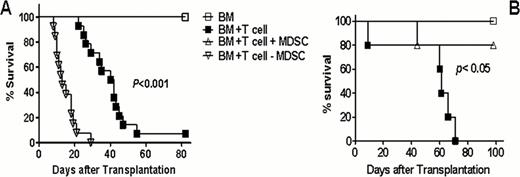Abstract
Abstract 2999
Myeloid-derived suppressor cells (MDSCs) are a group of myeloid cells comprised of hematopoietic progenitor cells and immature macrophages, dendritic cells and granulocytes. MDSCs accumulate in inflammatory diseases and various cancers. In this study, we investigated the dynamic changes and effects of MDSCs in graft-versus-host disease (GVHD) development and/or tumor relapse after allogeneic bone marrow transplantation (BMT). Using murine models of syngeneic and allogeneic BMT, we found that MDSCs transiently accumulated in the blood and spleen of recipients, but returned to the physiological levels shortly after BMT without GVHD. On the contrary, the levels of blood MDSCs always elevated after BMT with GVHD in the recipients of allogeneic BM+T cells. The MDSC accumulation was positively related with the severity of GVHD. In addition, MDSC accumulation was further increased upon tumor relapse. Although MDSCs isolated from both syngeneic and allogeneic BMT recipients inhibited T-cell proliferation under allogeneic stimulation ex vivo, MSDCs from GVHD recipients were significantly much suppressive compared to recipients without GVHD. Moreover, adding functional MDSCs in donor graft alleviated GVHD, whereas partial depletion of MDSCs in vivo using all-trans retinoic acid exacerbated GVHD(Figure 1A and B). These results indicate MDSCs may serve as a biomarker for acute GVHD and tumor relapse after allogeneic BMT. The accumulated MDSCs are not sufficient to completely prevent GVHD although they do ameliorate GVHD. Hence, manipulating MDSCs could be implicated in allogeneic BMT for controlling GVHD or tumor relapse.
No relevant conflicts of interest to declare.
Author notes
Asterisk with author names denotes non-ASH members.


This feature is available to Subscribers Only
Sign In or Create an Account Close Modal